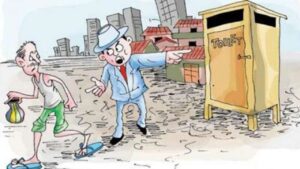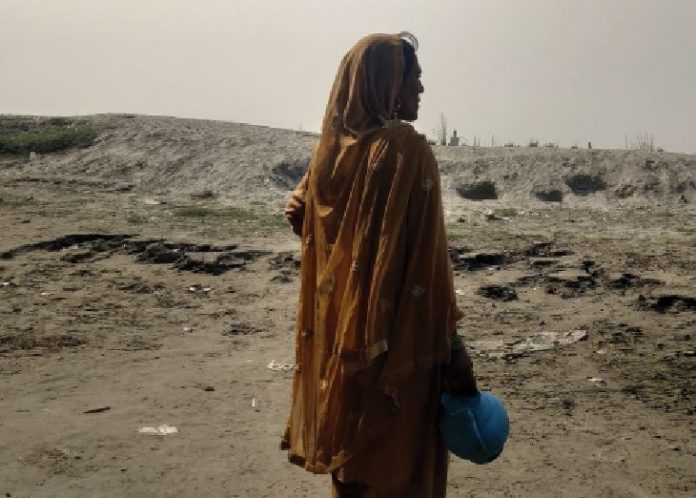“The sad state of Swach Bharat Abhiyan in a Kora-Mundi village”
By-SANCHARI SAMANTA
Eight months pregnant, 19-year-old Tokor Kora holds a metal bucket of water on one hand and her one-and-a-half-year-old in the other as she makes her way to the Banka river banks to attend to nature’s call at 4 a.m. This she does every day in order to reach there before others wake up.
Just in front of Tokor’s hut, a half-constructed toilet, built under the Swachh Bharat Abhiyan scheme lies unusable for over a year now. The three toilets provided by the municipality to the 300 families residing in Kora para, a village in West Bengal’s Purba Bardhaman district, come with just one tap and without any water supply. The villagers use the toilets but have to carry water from the Banka river.
For Tokor, and many like her in the village of mostly the Kora-Mundi tribe, good sanitation and water facilities remain more of a utopian idea than a basic necessity.
The Kora-Mudi Scheduled Tribe lives in parts of Bardhaman, Midnapore, Bankura, and Purulia in West Bengal. According to the 2011 census, the total population of the Kora tribe in West Bengal is around 1,59,404. The tribe is the fifth-largest community in West Bengal that speaks Kora or the Mon-Khmer language, which is said to be one of the world’s primary languages.
The lack of toilets particularly affects the pregnant women in the localities, who face many hiccups due to lack of amiable sanitation atmosphere. The health implications are many, and Tokor  has been warned of them by her doctor Madhulika Chatterjee of the Burdwan Medical College and Hospital under whose surveillance she will deliver her second child. “I have to hold urine for long due to the long queue in front of the bathrooms. This is not recommended during pregnancy, and it is difficult to go to the riverbanks in this condition,” Tokor says.
has been warned of them by her doctor Madhulika Chatterjee of the Burdwan Medical College and Hospital under whose surveillance she will deliver her second child. “I have to hold urine for long due to the long queue in front of the bathrooms. This is not recommended during pregnancy, and it is difficult to go to the riverbanks in this condition,” Tokor says.
Representational Image credit:outlookindia.com
Similarly, Nadiya (23), who is four months pregnant, says she would prefer using a toilet only if she had one. The women have never heard of a scheme like Swachh Bharat Mission or their intention to build toilets in every Indian village.
According to the Swachh Bharat Mission Gramin report, 1.75 lakh households without toilets were identified in 2014 and by 2019, they were all given toilets.
But the task is not just about building toilets but reaching out with the awareness to eradicate open defecation especially when habits run deep. Shimul (16), another resident of Kora para, says she prefers defecating in the open, as the practice is culturally instilled in her. The same goes for 60-year-old Tulsi Kora, who does not use toilets, as she considers washing shameful.
“Almost 90% of the people here choose the fields for defecation. Until and unless they are provided with some education making them aware of the risk of losing their babies, this  won’t stop,” says Partha Basak, a member of ‘Speed,’ a non-profit organisation that works with members of tribal communities.
won’t stop,” says Partha Basak, a member of ‘Speed,’ a non-profit organisation that works with members of tribal communities.
This stands as a sharp contrast to what a local body councillor, Shikha Sengupta, says. Most households have a toilet and there are public toilets too in the village, she claims.
Image credit:Dnaindia.com
But the related facilities are hardly enough, says Nirmal Kora, 63. “The septic tanks that they [government] built for us are so small that they tend to overflow often. We have to clean it all by ourselves. What is the use of having toilets if we have to clean our waste twice? We would rather go out in the open.”
Dry or dirty
Apart from the directions to use hygienic sanitation facilities, Tokor was also prescribed by the doctor to consume filtered water to ensure a smooth pregnancy. But, in an irony of sorts, the village has no supply of clean drinking water. The only tap set up by the municipality does supply water but it carries with it a smell foul enough to abhor the drink.
Tokor then had no go but to go for bottled water (during her pregnancy). However, bottled water comes at a price unaffordable to most like her who earns making catechu to be sold in local paan shops. “We have complained to the municipality many times. The corporation people say they will soon address the issue but that never happens,” says Payel Kora, a resident.
Authorities, however, seem complacent about the issue. “Efforts are being made to provide access to a water supply to all the tribal households. They already get water twice a day from the municipality, and we think it is sufficient for them,” Subhash Sarkar, an employee at the Burdwan municipality, says.
The situation is quite pan-India, as per the 2011 census that states that around 26.66% of the tribal population in India do not have access to safe drinking water. According to the WaterAid report 2016, India lies among the worst-hit countries globally with around 76 million people having no access to safe drinking water. Seventy two-year-old Naresh Kora says they get water as charity at times. He recollects when some ‘rich’ people donated 7,570.824 litres that lasted them for several months. But such acts do not come often.
“NGOs now mostly give us food and clothes, but never water,” he says.

